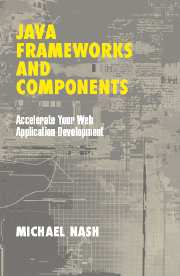Book contents
- Frontmatter
- Contents
- Acknowledgments
- 1 Components and Application Frameworks
- 2 Components: The Future of Web-Application Development
- 3 Application Frameworks: What Do They Provide and What Are the Benefits?
- 4 Choosing an Application Framework
- 5 A Catalog of Application Frameworks
- 6 Comparing Frameworks
- 7 Open Source and Components/Frameworks
- 8 Development Methodologies and Design Patterns
- 9 Integrated Development Environments
- 10 Strategies for Using Frameworks: Best Practices
- 11 Conclusions: The Future of Frameworks and Components
- Appendix: Case Studies
- Glossary
- Index
8 - Development Methodologies and Design Patterns
Published online by Cambridge University Press: 28 July 2009
- Frontmatter
- Contents
- Acknowledgments
- 1 Components and Application Frameworks
- 2 Components: The Future of Web-Application Development
- 3 Application Frameworks: What Do They Provide and What Are the Benefits?
- 4 Choosing an Application Framework
- 5 A Catalog of Application Frameworks
- 6 Comparing Frameworks
- 7 Open Source and Components/Frameworks
- 8 Development Methodologies and Design Patterns
- 9 Integrated Development Environments
- 10 Strategies for Using Frameworks: Best Practices
- 11 Conclusions: The Future of Frameworks and Components
- Appendix: Case Studies
- Glossary
- Index
Summary
FRAMEWORKS AND METHODOLOGIES
A software methodology is a set of guidelines, rules and, practices used in development projects. Some methodologies have more rules than others, and have a greater impact on the development process. As software development evolves, and comes closer to being recognized as an engineering discipline than an art, practices that work well are discovered through experience, and these practices are formalized over time into methodologies. Simply adding more rules and procedures, however, does not necessarily result in better methodology, in the same way that adding new functionality to a framework does not necessarily result in a better framework. Methodologies that are “lightweight,” but highly effective, are often the easiest to apply and the best in practice, as they impose relatively few burdens on the development process – and are therefore more likely to be actually used!
There are many parallels between development methodologies and frameworks, and we explore here how the two interrelate, and how your development methodology has an impact on your choice of framework, and vice versa.
Use of a framework does not necessarily imply that you have to work with a particular development methodology. Some frameworks have, however, been created with such methodologies in mind – a good example is the JUnit unit test framework. It was developed with the Extreme Programming methodology in mind, and is in fact ideally suited for use with this technique. Other frameworks were designed with Aspect Oriented Programming, or another similar methodology.
- Type
- Chapter
- Information
- Java Frameworks and ComponentsAccelerate Your Web Application Development, pp. 296 - 333Publisher: Cambridge University PressPrint publication year: 2003



